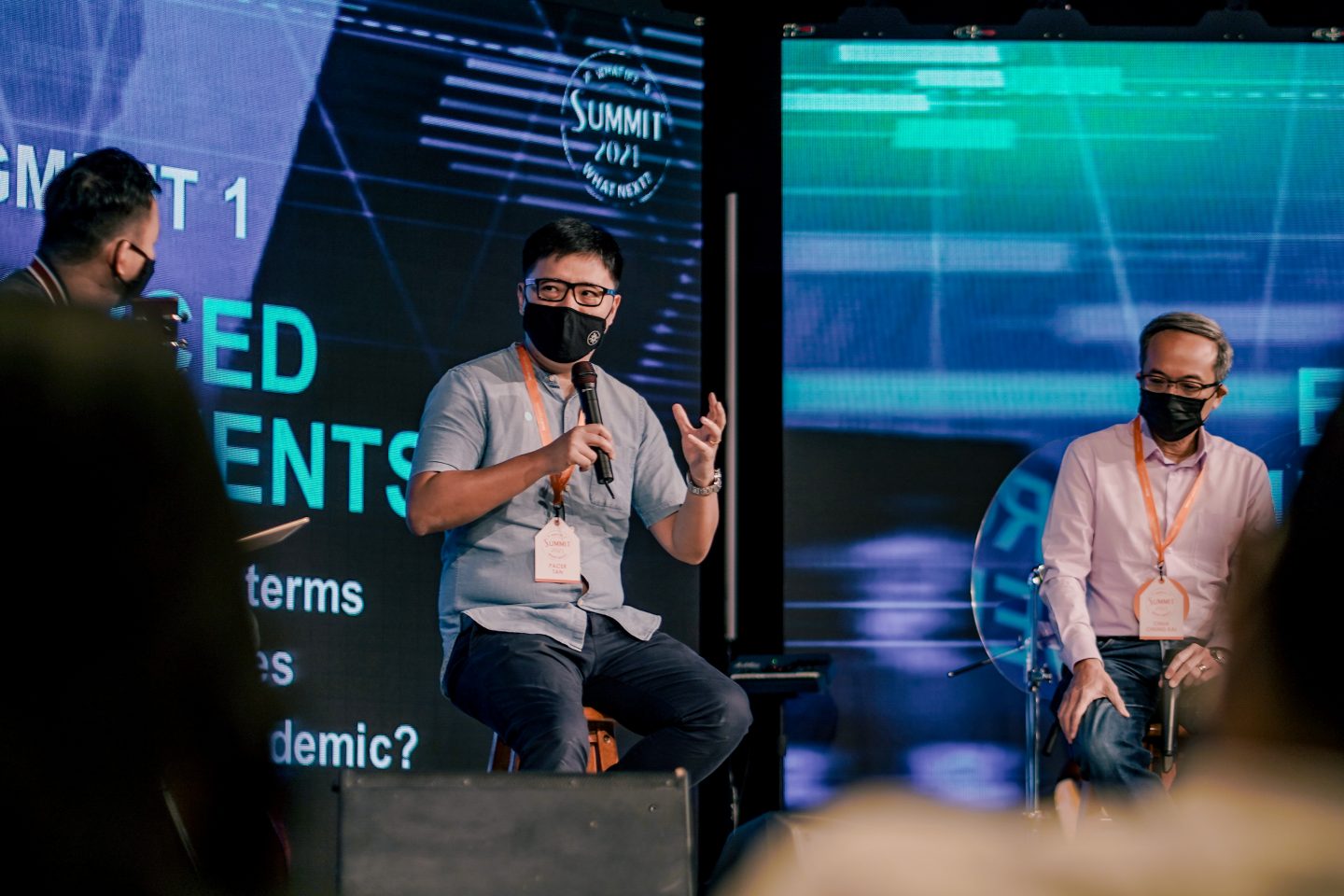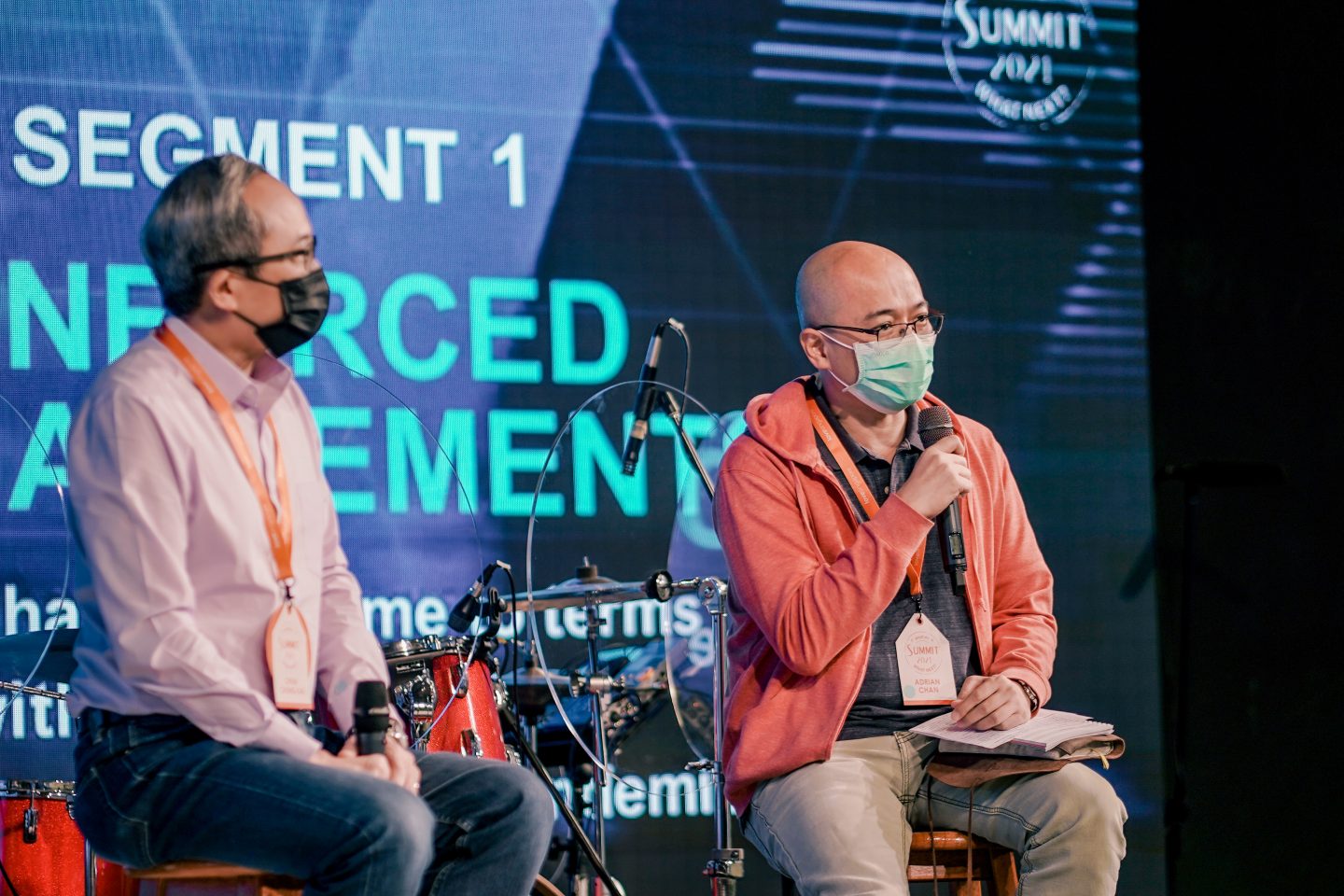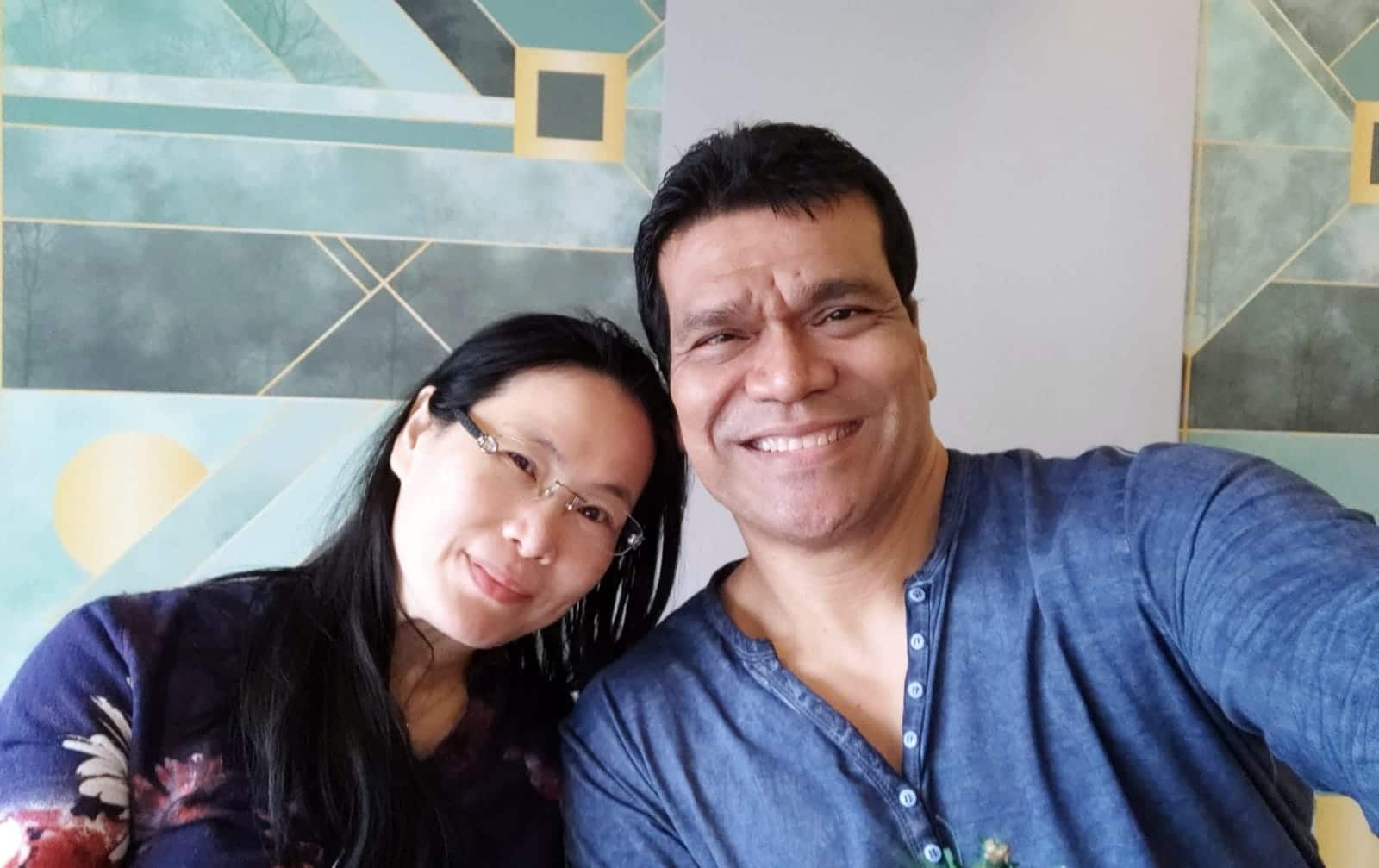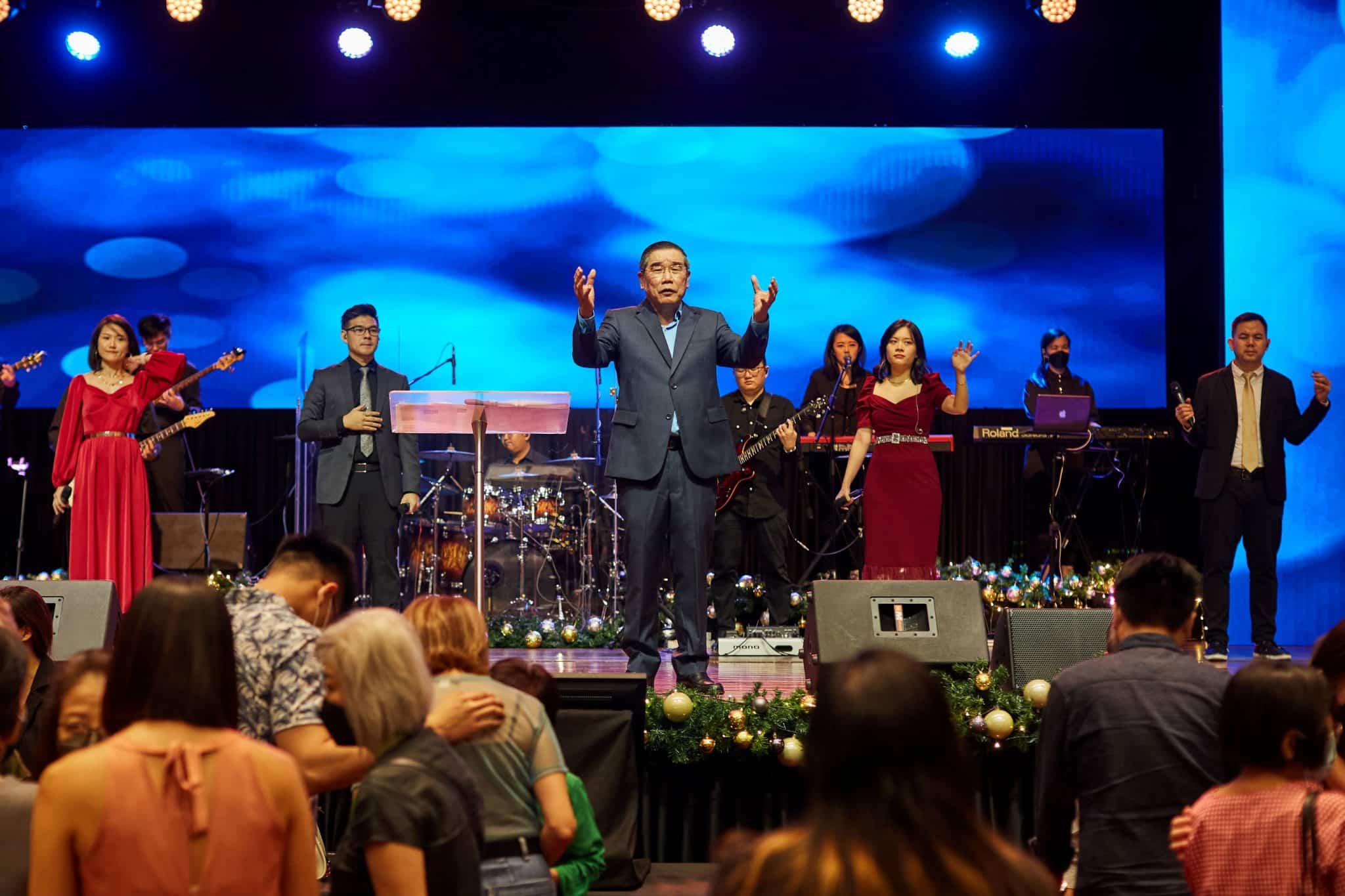Charting 2021 by lessons from 2020: Three church leaders share their experiences
by Gracia Lee // January 15, 2021, 5:28 pm

On the final day of the Pastors' Summit 2021, (L-R) Senior Pastor Pacer Tan of Lighthouse Evangelism, Associate Pastor Chua Chung Kai of CEFC, and Dr Adrian Chan, Elder Chair at International Baptist Church, shared what they have learnt from the pandemic. All photos by Ang Wei Ming.
What has the Church learnt in the pandemic? Will digital means be the main way it will operate going forward? What can churches do to keep the flame of evangelism from sputtering?
On the third and final day (January 14) of the annual LoveSingapore Pastors’ Summit, three church leaders sat down to share their thoughts on the Church in the new normal and beyond.
Facilitated by Pastor Edric Sng, Deputy Senior Pastor of Bethesda (Bedok-Tampines) Church, the panel included Pastor Pacer Tan, Senior Pastor of Lighthouse Evangelism; Pastor Chua Chung Kai, Associate Pastor at Covenant Evangelical Free Church; and Dr Adrian Chan, Elder Chair at International Baptist Church.

“God is doing a new thing in His church, in His kingdom, so that we may proclaim his praise,” said Pastor Edric Sng of Bethesda (Bedok-Tampines) Church who facilitated the panel discussion.
They shared their thoughts and experiences frankly with the audience of leaders from 107 churches and 36 Christian organisations.
What has come out of the church being forced to adapt to the reality of Covid?
Ps Chua: For me, mainly three words capture this season in terms of what we’re learning. The first word is “pace”.
We were all forced to slow down. Slowing down is very uncomfortable for a lot of us. Maybe the Church is more in the culture than we think we are.
I don’t think there’s anything wrong with fast or slow, but the pace at which our country moves doesn’t augur well for relationships.
This leads me to the next point, which is “gaze”.
It gave us a chance to look at ourselves. We were forced to ask fundamental questions: What is the Church? Is it more than just the worship service? What’s online? What’s onsite? What’s the difference? What makes the Church the Church?
So from pace to gazing at ourselves, asking fundamental questions.

“Slowing down helped us to ask ourselves more fundamental questions,” said Pastor Chua Chung-Kai from Covenant Evangelical Free Church.
The last word for me is “face”. We were forced to present a new face.
At Covenant, we never had online services. We were scrambling to get all these things going – the new face of communicating with our people.
I think what was really lost was our platform on Sunday, because most of the time that was our platform to lead the people. But once the platform was removed from us, many of us were forced to develop a new face.
Is going online a fundamental game-changer in how we do church, or is it a superficial change?
Pastor Tan: If you asked me this nine months ago, I would think it’s the former. But now I see it as a superficial necessity. And what I mean is, the problem with using online platforms is that there’s more bad than good. That’s the truth.
It’s a good tool, we have to use it. This is a season that God has allowed us to be in, so we have to roll with that.
But the problem is that being online causes so much negativity. Not just the content surrounding online sites, but there are a lot of emotional, psychological, mental and physical ramifications.

“My prayer for my church is that once things are more settled … they will yearn to be physically in God’s house,” said Pastor Pacer Tan from Lighthouse Evangelism.
I do like what the church was, not because of methodology, but the closeness, the support, the fact that you can come in and you don’t have to be thinking about zones. I miss the good old days from the standpoint of just thinking: Okay, we want to get the people in, let’s worship the Lord, let’s encounter Him. Let’s do altar ministry at the end.
I see the downside as: It really detracts from what the church can be. My personal feel is, I don’t want all the churches in Singapore to be “lifechurch.tv”. Then we’re really lacking a lot of the engagement that comes with sitting with a brother or sister.
My prayer for my church is that they will miss those things and once things are more settled, whether it’s seven months, one year or two years, they will yearn to be physically in God’s house.
Survey findings suggest that church members are less engaged. Do you believe this to be a temporary blip or the new normal?
(In a recent survey done with over 200 church leaders, 60% of respondents said that their members are much less engaged or somewhat less engaged with the church as they were before Covid. About 3 in 10 felt that less than half would return to physical services.)
Pastor Chua: Whether we believe it or not, we as a Church are being tested.
One of the reasons most of us don’t like to go to the doctors for our health checks is because we are afraid of the results, isn’t it? But, whether we like it or not, I believe we have been handed a health check.
I think it’s better for us to face it now and say: Oh, like that ah. I think it’s good not to rush through this and try to get over things. Let’s look at it and stare at it and say: This is the state of my church. It’s something I need to pay attention to.
I think coming to that awakening is a very key thing.
“Let’s look at it and stare at it and say: This is the state of my church. It’s something I need to pay attention to.”
Pastor Tan: Engagement and evangelism are talking about the health and vitality of the church. It is a definite concern. My honest take is that the graph will go down, we’ll hit a new normal where we stabilise, and then when it’s all said and done, we can push up again.
Dr Chan: I think we have to figure it out as collective. You see, you can’t watch prayer on your TV screen. You can’t watch worship on your TV screen no matter how good the musicians are. You have to participate in the worship.
And so, all of a sudden, as a family, we turn on the TV and start streaming, and suddenly someone in the household … needs to be the worship leader, somebody’s got to take charge, somebody’s got to be the priest, the prophet, prayer warriors. And not many people are very equipped for that. So it’s a collective figuring out.
Maybe as leaders we feel responsible, maybe we feel that we’ve become such critical providers that we’ve stood in the way of God to equip His people.
What can churches do to fan the flames of evangelism among members?
(In the same survey, 60% of respondents said that their church’s evangelism programmes or events have been affected by Covid. In the same vein, about 2 in 5 respondents said their members’ passion for evangelism has been affected.)
Dr Chan: Usually, at least in my church, evangelism happens within the context of ministries. Ministry is the container by which these activities flow. But we’re figuring out, maybe it’s not about ministry anymore, because how do we rally people when we have to do safe distancing?

“Maybe we have to move from ministries to movements. Go where the Spirit of God is,” said Dr Adrian Chan from International Baptist Church on the changing face of evangelism.
Maybe we have to move from ministries to movements. Go where the Spirit of God is. Move where the Spirit moves.
We probably have to struggle a lot with the unlearning before we can go up. This valley is not a bad thing, but we have to keep learning and keep seeing where it goes.
Pastor Chua: This is a story from CEFC. In 2019, one of our pastors was having a meal with his family in Geylang. A migrant worker, out of the blue, came and sat with them and started speaking to his son, and they built a friendship from there.
In that year, somehow the Lord also linked us up with a pastor from India who had just graduated from Singapore Bible College. That was in 2019.
“There are lockdowns in terms of the physical constraints, but yet at the same time God is also creating incredible openings.”
Nobody knew that in 2020 this incredible crisis would fall on everybody. During that period, the migrant worker situation exploded. But the Lord stirred in the hearts of a few members of our church and they rallied a whole team of people to deliver meals to over 1,000 workers in the course of morning, afternoon, night.
It was incredible. God just blew open the door for us. We look back at that work now and we are astounded. We could never have done that.
If you ask us to plan for migrant worker outreach, we’d say it’s a three- to five-year plan before we even reach those numbers.
What I’m trying to say is that there are lockdowns in terms of the physical constraints, but yet at the same time God is also creating incredible openings.
Press on in our relationships, don’t miss these incredible, crazy opportunities that God is just directing us to by His Word.
What is one phrase or word to describe what the church in the new normal and beyond should look like?
Pastor Chua: I think the first word is “awaken”. Awakened in the sense that we come face to face with where we are. We recognise the good stuff and some bad stuff. I think that’s important.
The second word is “deepen”. A deepened church. For those of you who enjoy wine, you’ll know that certain years, certain vintages are very expensive. And the reason why it’s expensive is not because those were good years actually, they are actually drought years. Very bad, hot summers. But those very bad, hot summers make the roots of the vines go really deep into the soil to draw out the water, draw up the minerals that are hidden inside. The harvest of those grapes are incredible.
I sense this is an opportunity for the church to grow deeper in our dependency on God. The sooner we realise we have no solutions, the better. If we know that only the Lord can make a way, we will be a strengthened church.
Dr Chan: I’ll latch on to the word: O-N-E.
O stands for Oikos. To go back to the family. Now is the time when the church begins with the family. Every family is a church. We learn from the experience of being church in family so that we can be family in church.
N stands for “be nothing unto ourselves”. We must decrease so that God can increase. If nothing else, this pandemic is showing us that whatever you try and plan for, it will fail. Big big giants in recent days have fallen. We have to decrease.
And if we have these two, then the E can emerge: Ecclesia. We cannot be so big to ourselves that we have five unities. That’s an oxymoron. There’s only one unity in Christ. There can be five organisations, but we must be united for the sake of the ecclesia.
So let’s be one in Christ.
Pastor Tan: One statement for me would be: Same mandate, different method.
The mandate has never changed since 2,000 years ago, which is to make disciples of all nations, baptising them in the name of the Father, Son and Holy Spirit (Matthew 28:19-20).
But the methods definitely have to change because now it’s really tricky. Now, ministry is very different. How many of us are doing ministry via Zoom? These are the tools that God has afforded us to use. So, same mandate but a different methodology.
I’ll just give one quick idea here. When the crisis hit us, some people from my church were asking me for my thoughts. And I said that this is still much better than having persecution. True persecution means that we can lose our lives if we want to hail the name of Christ. I’m thinking back to the Day of Pentecost.
The Day of Pentecost story cannot be isolated. You have to go to pre-Pentecost, which is the death of Christ.
After the death of Christ, the disciples were scattered. They ran for their lives. You had some of the disciples like Peter and John wanting to go back to their fishing posts. But then they gathered together in the upper room.
Before you see the 3,000 people convert, you have to see that there was a crisis. Jesus was the evangelist, the man of God. Huge crowds had followed Jesus. Huge crowds! And then all of a sudden He is taken to task, He is eviscerated, He is murdered.
“The pandemic didn’t destroy faith. The Day of Pentecost, I believe, is coming again.”
On the Day of Pentecost, at the point when they were praying together, before the miracle happened, before the tongues of fire in Acts 2, I can imagine what must have been going through the minds of the apostles: This is crazy. I can’t believe that just two weeks ago we were following the Messiah and everyone was just amazed. Now we’re on the run, we’re in hiding!
I share this is because I want to encourage all of us here: The pandemic didn’t destroy faith. The Day of Pentecost, I believe, is coming again. Why I say this is because in church history, every time the Church of Jesus Christ takes a beating, we’re reminded of Romans, we’re reminded that the love of God still stands, we’re reminded that nothing will separate us from it.
There’s going to be shifting and sifting.
But finally, when all is said and done, there will still be the people of God that will shine. That’s for sure.
FOR MORE NEWS FROM PASTORS’ SUMMIT 2021, READ:
“A spiritual leader must leave no brokenness unhealed”: Pastor Daniel Foo
Lament! President of NCCS exhorts leaders at Pastors Summit 2021
We are an independent, non-profit organisation that relies on the generosity of our readers, such as yourself, to continue serving the kingdom. Every dollar donated goes directly back into our editorial coverage.
Would you consider partnering with us in our kingdom work by supporting us financially, either as a one-off donation, or a recurring pledge?
Support Salt&Light


